Ladies and gentlemen, look at Kong, the Eighth Wonder of the World.
Pix--of Pix's Origin Adventures has made an astonishing discovery about Wing Commander's prehistory: Chris Roberts' first game, printed in the April 1983 issue of BBC Micro User. It's an arcade game called King Kong based on the famous movie. The player flies a helicopter which must rescue captive women and then shoot the great ape. Roberts wrote the game when he was just 14 years old. It was released as BASIC code printed in the magazine which you could type in and then play. You can read more and even try the game itself here.
I'd like to let you know that I've posted a picture of my Data Capsule model in the WC2Remake/Enigma 2666 Thread. It is pretty much a simple model.
As always, anyone is welcome to play, but understand the following things:1. The game is still in development. There are bugs.
2. You are not obligated to help bug hunt, but it helps. That said, just being in the game helps!
3. Don't make suggestions for improvement for now; only point out bugs and or cases where the behaviour is different than the manual.
4. Be moderately aware of the progress of WCTOO, you can do this by reading through this forum!Alpha Game 5 is going to focus on three things:
1. The new 'Basic' Pilot Skill System
2. Tailing (still very buggy)
3. Missile Evasion (mostly good)
4. EDIT: Large maps! (This will be our first map that takes a lot of scrolling to play)That means I expect you guys to try to use the above features at every opportunity, even if that means tailing your wingmates. (If you're really dedicated to the cause, fire a missile at your wingmates!) If I haven't chased you away yet, Welcome Tester!
To join Alpha Game 5, you must do the following things:
1. Go to the Phase 5 Game Site and make an account if you don't already have one.
2. Post here that you are going to play and declare your ship choices!
A. Everyone gets 3 ships.
B. Each ship must be from a different category: (light/medium/heavy fighter, bomber)
C. You can mix confed/kilrathi ships, but realize the FF's IFF recognition is by race, not team. (In fact, teams don't exist)
D. I will be "randomly" assigning a different skill level to each of your ships. Some of you will be stuck with a 'Green' ship, some with an Elite, and a lucky person is getting a 'Legendary' ship. The rest will be spread so that everyone will have at least one Regular/Vetaran.
E. Post the Ship's Callsign and its Pilot's Name (this can be your username, but doesn't have to be).No rush, but I expect this game to start in about 2 weeks.
HAPPY BIRTHDAY WING COMMANDER FROM THE ENIGMA 2666 MOD ;)
This is the last in this series of Privateer 3 updates. We hope you've enjoyed seeing 'what should have been.' We're ending with three of the game's space stations: Hades, Kronos and a medical station.
When the Confederation's generals gathered in 2634 to observe the first YCF-131 Broadsword combat tests, they didn't expect much - no carrier based plane had ever damaged a ship of the line. Their fears were eradicated immediately when the prototype ("Sorcerer of Death", Tail No. CHR317) scored four simulated nuclear strikes against a captured Yan battlepod. The Broadsword was rushed into production and since earned its stripes in nearly seven decades of fighting Pilgrims, Kilrathi and Nephilim.
Today's Privateer 3 update is another Wing Commander mainstay--a redesigned Drayman-class freighter, seen in several high resolution renders and an exciting action shot that places it alongside Piranhas and other escort ships (including what looks like Wing Commander IV's Hermes shuttle.)
Next up is the Salthi, hotrod of the Kilrathi Empire. This one doesn't have any variants, but I might go back and make an ace version, with more paint, maybe some fins, that sort of thing.Oh, and I've just finished making the big ol' flying pancake that is the Dralthi. Only the Mk1 as of yet, the Mk2 would need a bit more work. I gave it a half WC1 ingame and half Academy TV colour scheme. Now, I'm working on the Krant. Then I'll probably build the Ralari.)
Today's Privateer 3 update features just one image: a rendering of the Terran Confederation's powerful Manowar-class battle carrier. It looks like quite a ship--too bad it never left the drawing boards.
A reminder that tomorrow at 7 pm EST in #wingnut the Wing Commander Combat Information Center is holding the Future of Wing Commander Conference. We'll be talking about the latest news on the Wing Commander front: the GOG releases, WCA and the Movie DVDs, the latest rumors on Chris Roberts' project, the battle plan for reaching WCPedia's 2011-12 content goal, and many other exciting things in Wing Commander's future.
If you're a wingnut, you owe it to yourself to be there. We're going to reunite you with your old friend, the thrill of battle.
As John Paul Jones said, I have not yet begun to dogfight!In the first episode of Wing Commander Academy, "Red and Blue", Maniac misquotes the first hero of the American Navy, but carries on the spirit of John Paul Jones' famous moment.
On 23 September 1779, the converted merchant Bonhomme Richard, commanded by John Paul Jones, engaged HMS Serapis, commanded by Captain Richard Pearson off Flamborough Head, England. Bonhomme Richard was a 42-gun rebuilt merchant ship. Serapis was a 50-gun frigate on convoy escort duty.
Just after 7 p.m. the two ships exchanged fire and opened the Battle of Flamborough Head. During the first half an hour of combat the Bonhomme Richard ran into the stern of the Serapis. Captain Pearson is reported to have yelled the query, "Has your ship struck?". John Paul Jones' reply was simple and direct, "I have not yet begun to fight!"
For several hours the two ships exchanged fire. Jones' goal was to ram his ship into the Serapis and commence a close action. When Jones finally accomplished his goal around 9:30 p.m. The Bonhomme Richard had been holed repeatedly below the waterline. After an hour of combat, Captain Pearson personally struck his ship's colors and called for quarter. John Paul Jones had won the engagement and captured the Serapis, but the Bonhomme Richard could not be salvaged and sank the next day at 11 a.m.
Here's a very pretty update: renderings of the game's player ships, Nemesis and Aurora-class, in different colors and with different upgrade options. This would have been a beautiful game...
These images were in a directory labeled 'misc,' but they may be the most interesting of the lot! Here you have a still of a landing video (very similar to Privateer 2), renders of all the game's gun options, a promotional "jumping" render and two shots of the game itself in action!
What's the actual relationship to the Wing Commander series (or maybe even other Origin games)? Crusader is using the same dating system as the WC games (and placing it before those, as far as I remember) and the WEC is being mentioned in the WC series as part of terran history. Did you just add some WC references as easter eggs to the Crusader games or did you actually think of them as part of the same universe?There is no relationship between Crusader’s universe and that of any other game. The designers liked putting in the occasional cross-reference to other Origin titles – like the crashed Kilrathi spaceship from Wing Commander that can be found on a farm in Ultima VII – but those were basically just Easter eggs and no serious thought was ever given as to how the disparate game worlds might be one and the same.
It's also worth noting that many of the screenshots included are from Crusader: No Regret, which is not available through GOG--yet!
The last 'planet' picture in our series is the port screen for Maxor. Maxor doesn't appear in the promotional literature, but it's clearly a commodity-heavy world. Privateer 3 would have featured over fifty unique ports!
Going with a Jalthi next, it was always my favorite Kilrathi design in wc1. Both reference sources, the manual and the in-game sprites have the guns exactly at that position, so I gotta keep them there. Besides, the ship wasn't really meant to look fast, but a slow giant with massive firepower, the characters in the game say as much too.I've started messing around with the textures in the main hull parts, although it's looking a little plain without additional plates and stuff on the body, maybe I need to go back and do those. I've tweaked the textures a bit, added more detail to the mesh. Opinions?
Today's Privateer 3 screenshots show an AI Vaktoth class light fighter in various stages of development--from the initial mesh through texturing to an action scene! It's not known if this is supposed to be the same Vaktoth seen in Wing Commander III and Prophecy... it certainly looks different!
As previously mentioned, the CIC is going to hold a Wing Commander conference on September 24th, the anniversary of the destruction of Kilrah.
Join us on the 24th at 7 pm EST in #wingnut on IRC to discuss future plans for the Wing Commander CIC, the WCPedia project and the Wing Commander franchise itself! Be the first to hear information about upcoming Wing Commander projects, and learn how you can help make this the best year yet.
The CIC staff and #wingnut regulars will be around throughout the day, so even if you can't make it to the meeting, stop by and say hello! It's always good to see friendly ships!
See you there!
This pair of gameflow screenshots show the hangar and port for Theseus. There's no description for this world, but it certainly looks interesting... full of technology and a lizard suspended in yellow liquid!
These two screenshots show the vista and hangar of New Paris. New Paris is evidence of Privateer 3's unusual direction for human culture--it is an older, technologically advanced planet ruled by a monarchy!
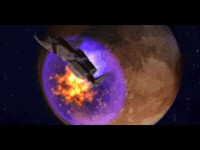
On 24 September 2669, Colonel Christopher "Maverick" Blair dropped the Temblor Bomb resulting in the destruction of Kilrah.
To celebrate the anniversary we're calling all Wingnuts to drop by #Wingnut on IRC to talk Wing Commander, play some multiplayer games (Arena, Armada, WCP MP), and especially talk about the WCPedia project. Recent events have kept everyone pretty busy lately, but we do have goals to reach in the next year.
The 24th is a Saturday, so wingnuts should feel free to drop by all day. The CIC staff and #wingnut regulars will be around to talk shop and play some multiplayer games. The WCPedia meeting will take place at 7 pm EST. We'll be talking about all aspects of the project, so if you're curious about it, or want to volunteer, drop in!
We look forward to seeing you there!
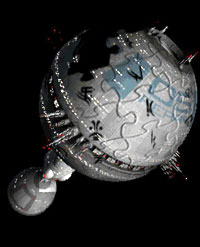
Welcome to G'Tok IV, a Kilrathi manufacturing port. These screens show the city's landing pad and space port. The official description reads: "G'tok IV is a floating industrial city. Built forty years ago, it is still expanding to this day. Antigravity engines keep the platform afloat above the toxic surface of the planet which is heavily laced in highly concentrated sulfuric acid. The atmosphere is poisonous but a rebreather is all that is required, though a trip to the surface without a full body suit would result in death. G'Tok IV is a prime example of Kilrathi ingenuity and determination to dominate everything they can use. G'Tok IV is known sector- wide for its refined tritanium."
You can head on to the downloads section to check out this new ship, which we've dubbed Artemis-class, and which will be present in Standoff's next episode among the many civilian ships that fell to the Kilrathi offensive in orbit around Mars. This patch will replace the Raptor in Standoff's simulator with the Artemis, and will temporarily disable sending your scores to the online scoreboards (for all ships), but it can be uninstalled through the Windows Add/Remove program control panel.
These are the first of several updates showing off high resolutions of Privateer 3's different planets. This is Yena, one of the game's agricultural worlds. The two screens were the planet's port and hangar. The official description reads: "Yena produces some of the finest in synthetic meats found in the quad. Its close proximity to New Damascus and Vigilance assures it of a steady supply of credits for its goods. However, much of the wealth is squandered by the government which constantly is finding new environmental concerns on which to spend money. Yenans are a hard, proud people, though many off-worlders think of them as loud and obnoxious."
These screenshots show unfinished versions of the game's planetary menus, which are very similar to the booth system used in Privateer 2! The first is the game's commodity system, while the other two are planetary info kiosks. The "most wanted" tab is an especially cool addition!
Here are a collection of sketches developed early in the design process of Wing Commander III, from which both 3D models of ships were built and actors were cast. Note the even sexier take on mechanic Rachel Coriolis.
Below is a PDF download of one of my favorite 'behind the screens' documents--Wing Commander III's prop book. It contains sketches, correspondence and notes about the prop selection for the game. Everything from the contract with the helmet manufacturer to the discussion about what chairs to use on the Victory bridge!
Unfortunately, very few Wing Commander III storyboards have been archived--but we do have a small selection! Check out these sketches and their accompanying script pages:
How much work did it take to 'build' one of Wing Commander III's virtual sets? Check out the evolution of Gunnery Control, from the initial concepts to the finished render!
Here are some fascinating Wing Commander III "set" sketches by Origin artist Mark Vearrier. Check out how much detail went into the asteroid!
Here's a rare treat--"bigger" renders of two of Wing Commander III cockpits, courtesy of Origin artist Craig Halverson. In this shot from his portfolio you get to see areas of the screen cut off in the actual game!
You've seen the candids--now here are the fancy, black and white posed photos from the Wing Commander III set. Things look more spacious and less chaotic!
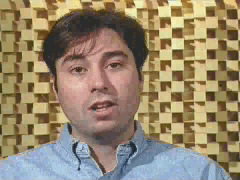
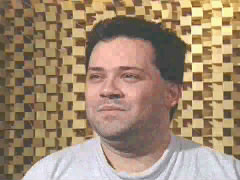
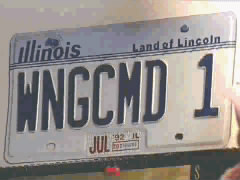
Here's an interesting comparison--a shot from Wing Commander III's early test rendering (left) compared with the finished game (right); note how much the set was changed as time went on... even the fighter class in the air above was switched!
There's a lot of video in Wing Commander III... but there could have been more! Several scenes were cut from the finished game to enable it to fit on smaller CD-ROMs--the first generation of CD 1x CD drives was unable to read the now-standard 72-minute CDs, forcing Origin to cut down WC3. Removed from the game were the famous "Hobbes explanation" and a variety of 'infobursts,' short news segments where a reporter talked about the state of the war. Thanks to their inclusion on later console ports, you can access and download all the scenes here.
Here are a host of screenshots from beta versions of Wing Commander III--can you spot the differences?
Every Wing Commander team earned a t-shirt for their hard work... and this is what the Wing Commander III shirt looked like!
The public's first look at Wing Commander III was this set of screenshots, set up to show off the game's 3D engine in action! You may note many differences, including a triangular transport which did not make it to the final game and different textures for the inside of a carrier.
These fourteen screenshots were the first images Origin put out from Wing Commander III's FMV. These pictures changed everything--no one had any idea it was going to look like this. I remember downloading these in a (then) big pkzip file from Compuserv's flight sim area...
Here is the "sell sheet" for Wing Commander III--the first document sent to retailers to convince them to place orders for a new game! I love the bit about Wing Commander III being the equivalent of 1,200 floppy disks.
Want a good example of the craziness behind the Wing Commander III PR campaign? Here's a three-page UK promotion for the game which involves a contest to fly a Russian fighter jet!
Wing Commander III featured an impressive array of fighters and capital ships--more than any previous game! Note the new distinct 'knife like' look for all Kilrathi ships--a result of an effort to develop a more unified look for the Wing Commander universe.
One of the many major changes for Wing Commander III was the switch to a new composer. Origin hired George Oldziey in 1994 as their in-house composer, and he quickly made his mark on the Wing Commander saga. You can download a variety of mp3s and collections of the game's MIDI tracks below. Music from Wing Commander III was also included on two albums--Origin Audio CD Vol. III, includeed with the premiere edition of the game, and a promotional CD called Music from the Wing Commander Universe released by George Oldziey.
There's no question that Heart of the Tiger's box art was designed to evoke the original Star Wars posters--it even uses the X-Wing-like Longbow bomber rather than the more emblematic Excalibur! Still, the art is magnificent:
The special "feelie" included in Wing Commander III was a fold-out poster called "Warbirds" which showed the game's Terran and Kilrathi fighters. The version included in the standard game was monochrome... but the one included with the Premiere Edition was full color! Check it out:
Another big first for Wing Commander III was the release of a 'Premiere Edition.' Now common, such a special edition was a big deal at the time; it was $100 and you had to call Electronic Arts to order it in person. The game came in a huge, flat cardboard pizza box that included all the normal game items plus a color version of Warbirds, a soundtrack CD, a 'Behind the Screens' CD, a t-shirt, a 1995 calendar, a VHS 'making of' tape, a folded poster and a copy of Fleet Action. The edition was also available in German, where it came with a different white t-shirt! Sam's Club also had their own version of the package, which came in an enormous Wing Commander III box!
The PC version of Wing Commander III was a massive success, spawning a host of ports on that generation's new, more powerful 32-bit consoles.
3DO: The 3DO version of Wing Commander III is one of the finest console ports ever created. Rather than tax the 3DO hardware trying to recreate the PC version of Wing Commander III, the 3DO version instead opts for a different experience--the graphics aren't as impressive, but the gameplay (including every mission) is redesigned for faster, more action-oriented gameplay. The result is an entirely new Wing Commander III experience.
PSX: The Playstation port tries to emulate the original release, with a great deal of success. Some cuts were necessary--including ground missions--but the larger size of the standard PSX discs did allow for more videos. Unfortunately, it has some difficulty running on modern iterations of the Playstation.
Macintosh: The Macintosh version is almost identical to the PC release. It was developed by Lion Entertainment in Austin, a group that worked closely with Origin.
Windows 95: The Windows 95 version of Wing Commander III was first included in 1997's The Kilrathi Saga package. The only major change in the release was a switch to digital music, which unlike the other Kilrathi Saga ports was not reorchestrated. In Japan, this version was sold separately.
At least three other ports were cancelled at some point in their development. When the game was released there was talk of doing a separate optimized version for Pentium computers. Another version, for the Sega Saturn, was announced and actually shown at a trade show but later abandoned. Finally, a version for the M2, sucessor to the 3DO, died with the console itself.
Here's one more short document from the Wing Commander III development team--a list of special tools created for the PSX version. It's interesting to see how much work goes into these things before the sort of development we're familiar with can even start.
LKoski: I have not bought WCIII but have seen and played it on my friends computer, exactly what changes were
LKoski: made for the 3DO version?
OSI: recompressed movies, faster load times, Higher color of the movies (64K colors instead....
OSI: 256), The audio is 16 bit stereo and it is in dolby surround, because we were able to ....
OSI: use the larger 74 minute CD capacity of the 3do format we could add footage that was not....
OSI: included in the PC version....
Wing Commander III marked a jump from popular game to Star Trek-style franchise. For the first time, regular companies wanted to license the Wing Commander IP--and lucky consumers could get card games, posters, novels and the like at their local stores. The first big licensee was a company called Zanart, which made t-shirts, hats and something called "Chromart." Chromart, a thoroughly 1990s idea, was framed artwork with portions printed in reflective chrome for a slight 3D effect. Zanart put out two Wing Commander 3 shirts, a logo hat and two Chromart pieces. The shirts and Chromart offered the choice between the Excalibur-bombing-Kilrah scene and the box art.
If you liked it then you should have put the Wing Commander III logo on it! Origin's promotions department went Wing Commander III crazy, branding everything from luggage tags to binders to... paper plates? It happened!
Wing Commander III inspired more books than any other game in the series--not only an assortment of guide books, but also a novelization published in three languages! There were three different official guides--Origin's Official Guide, the Authorized Combat Guide and a Japanese-only book about the Playstation port. The Authorized Combat Guide was also translated to French.
There were also an array of unofficial guides. The English one, from Prima, was famously poorly designed. Several others were available in Germany: The novel, by Dr. William Forstchen and Andrew Keith, has been published in English, German and Czech. All three versions have different covers:Here's a cool collection of high resolution Wing Commander III images intended for print--decorate your home!
Click below to download Wing Commander III's "press book"--a large collection of magazine reviews and other clippings about the game maintained by Origin.
Wing Commander III prompted hundreds of magazine articles in 1994-95, all over the world! Here are a few cool samples, from France, Greece, Australia and the United States!
It's a job that didn't exist even five years ago. The main difference is the fact that the story can branch in different directions, different things can happen, so unlike a conventional script that has one storyline. This one was great fun and I actually looked forward to going to work because it was new, because it was something I hadn't done before.I'm amazed at the shelf life of this project. It goes on and on and there's new toys and a new generation of kids who watch it on tape. I'm not actually involved in the next one, they go back to the previous generation. I will be in the audience now for the new Star Wars.
As we celebrate Wing Commander III's first widespread retail availability since the late 1990s, we would like to mention for anyone that we have the game's source code in our offline archive. We know it's frustrating for fans, who could do amazing things with this, to read these updates... but it's also in everyone's best interests to remind EA that we have the raw material from which they could port Wing Commander III to a modern computer or console. Just let us know!
Here are some nice portraits of the Wing Commander III team. In order: Adam Foshko, Chris Douglas, Chris Roberts, Craig Miller, Dan Orzulak, Frank De Palma, Frank Roan, Galen Svanas, George Olziey, Kirsten Maryott, Mark Chandler, Martin Galway, Nenad Vugrinec, Prem Krishnan, Tim Ray, Tony Morone, Tuesday Frase and the QA team!
GAME MATERIALS
Product Manager - Galen Svanas
Documentation - Tuesday Frase, John McLean, Melissa Mead
Document Translation - Brigitte Fleeman, Isabelle Rice
Editing - David Ladyman
Box Design - Al Carnley
Cover Art - Sam Yeates
Documentation Design - Al Carnley, Catherine Cantieri, Trey Hermann
Blueprint Design - Trey Hermann
Calender Design (Premiere Edition) - Jennifer Davis
T-Shirt Design (Premiere Edition) - Trey HermannCAST
Col. Christopher Blair - Mark Hamill
Admiral Tolwyn - Malcolm McDowell
Maj. James "Paladin" Toggart - John Rhys-Davies
Capt. William Eisen - Jason Bernard
Maj. Todd "Maniac" Marshall - Tom Wilson
Chief Tech Rachel Coriolis - Ginger Lynn Allen
Lt. Robin "Flint" Peters - Jennifer MacDonald
Lt. Ted "Radio" Rollins - Courtney Gains
Lt. Winston "Vagabond" Chang - Francois Chau
Lt. Laurel "Cobra" Buckley - B.J. Jefferson
Maj. Jace "Flash" Dillon - Joshua Lucas
Lt. Mitchell "Vaquero" Lopez - Julian Reyes
Col. Jeanette "Angel" Devereaux - Yolanda Jilot
Newcaster - Barbara Niven
Bartender - J.P. Pereat
Voice of Thrakhath - John Rhys-Davies
Voice of Melek - Tim Curry
Voice of Emperor - Alan Mandell
Voice of Hobbes - John SchuckGAME DEVELOPMENT
Producer - Chris Roberts
Director - Frank Savage
Associate Producers - Prem Krishnan, Jean-Marc ChemlaPROGRAMMING
3-D System - Frank Savage
Capship Polygonal Engine - Frank Savage
Spaceflight System - Frank Roan, Frank Savage
Gameflow System - Chris Todd
Object System - Frank Roan
Atificial Intelligence - Frank Roan
Nav-Map System - Anthony Monroe
Cockpits & Sound Effects - Antohny Monroe
Movie Compression & Playback - Jason Yenawine
JEMM DPMI 32-bit DOS Extender - Jason Yenawine
SGI Movie Editor - Oliver Yu
Object Data & Implementation - Tim Ray
Polygonal Collisions - Peter Shelus
Libraries - Jason Yenawine, Frank Savage, Tony Bratton Hi-Res 3-D Object Editor - Paul Isaac, John Reeme, Aaron Martin, Frank Savage
Math & Algorithms Consultant - Peter Shelus
Technical Consultant - Zachary SimpsonDESIGN
Initial Mission Design - Tim Ray
Mission Design & Implementation - Tim Ray, Ben Potter, Jeff Shelton
Gameflow Design & Implementation - Prem Krishnan, Chris ToddAUDIO
Interactive Sound Design - Nenad Vugrinec
NIM Interactive Music - Goerge Oldziey, Nenad Vugrinec
Spaceflight Dialogue Editor - Barry Leitech
Sound System by - Human Machine Interfaces, Inc.
Digital & MIDI Sound Engine - Aaron Martin, John Reeme, Frank SavageART
Art Director - Chris Douglas
Assistant Art Director - Paul Steed
3-D Artists - Chris Douglas, Mark Vearrier, James Lee, Thomas Lee, Chris Olivia, J.C. Combs, Alan Perez, Craig Halverson, Steve Pietzsch
RealSpace Objects - Paul Steed, Dean McCall, Michael Presley, Elizabeth Foster Pugh, Sam Laskowski, Jeff Shelton, Tim Ray, Ben Potter
Mission Briefing Animations -Paul Steed, Elizabeth Foster Pugh, Eric Lund, Dicko Mather, Jake Rodgers, Brian McLean, Gary McElhaney, Danny Garrett
Gameflow Options Screens - Brian McLean, Mark Vearrier, Chris Douglas
Cockpit Displays - Elizabeth Foster Pugh, Jennifer Ayers
3-D Software Provided by - Alias Research
Graphics Hardware Provided by - Silicon GraphicsPRODUCT SUPPORT
QA Project Leader - Dan Orzulak
Assistant Project Leaders - Anthony L. Sommers, Todd Wachhaus
QA Team - David Abbot, J. Allen Brack, James Flores, Mark Franz, Jim Hill, Kevin Kushner, Bill Lacoste, Jeremy Mappus, Sean Mustakas, David J. Reese, Mike Songry, Reece Thornton
QA Hardware Lab - Brian Wachhaus, Evan Brandt
Translator Liaison - Jeremy Mappus
Product Support Manager - Kay Gilmore
QA Supervisor - Donna Mehnert
Customer Service Supervisor - Marie WilliamsMOVIE PRODUCTION
Executive Producer & Director - Chris Roberts
Producer - Donna Burkons
Screenplay - Terry Borst, Frank De Palma
Casting Director - Nicole Arbusto, Joy Dickson
1st Assistant Director - Harry Jarvis
2nd Assistant Director - Athena Alexander
2nd 2nd Assistant Director - Tia Ardran
Production Manager - Pam Auer
Technical Director - Mark Day
Director of Photography - Virgil Harper
Assistant Camera Operator - Tom Kantrud
Ultimate Operator - Bob Kertesz
Ultimate Assistant - Greg Noyes
Sound Mixer - Walt Martin
Boom Operator - Paul Coogan
Script Supervisor - Kate Lewis
Storyboard Artist - Marc Baird
Set Designer - Cherie Baker
Gaffer - Reggie Lake
Best Boy Electric - Robert Neville
Rigging Gaffer - Eddie Maloney
Electrician - Shaun Goldsmith
Key Grip - Gus Vasquez
Best Boy Grip - Greg Etheredge
Grips - Jim Cocker, Kevin Cook, John Martin, Shane Brott, Jeff Murrell
Props - Josh Logan
Prop Master - Tamara Clinard
Dresser - Todd Szabo
Hair - Lana Sharpe
Makeup - Bill Meyer, Kim Miner
Wardrobe - Mary Paxton, Krista Schluderman
Set Costumer - Nan Gail
Construction Coordinator - Mike Clark
Construction - Shane Middleton
Kilrathi Puppets/Props Provided by - Precisions Effects
Creature Silt Supervisor - John Parsons
Suit Operators - Michael Hood, Billy Butler, Chris Bergschneider, Randy Harvey
Creature Suit Technicians - Rick Cedillo, Terri Fluker, Ron Ford, Alex Mindt, Gloria Munoz
Asst. Creature Suit Technicians - Linda Newman, Wendel Phillips, Mike Walters
Precisions Effects P.A. - Karen Carmichael
Puppeteer - Bud McGrew
Puppeteer Assistant - Kass Nassiri, Mike Newman
2nd Unit Director - Richard Johnson
2nd Unit Director of Photography - Bill Sheehy
2nd Unit Ultimatte Operator - Tom Tcimpidis
2nd Unit Gaffer - Henry Coccetti
2nd Unit Script Supervisor - John McLean
2nd Unit Sound Mixer - Mary Jo Devenney
Pyrotechnic Effects - Dream Quest Images
Pyrotechnic Supervisor - Robert Stadd
Pyrotechnic Shoot Director - Adam Foshko
EA Productions Counsel - Carol Contes
EA Productions Accountant - Tracey Snodgrass
EA Finance & Insurance - Bryan Neider, Sharon Warmboe
Production Accountant - Laurel Richter
Talent Paymaster - Karen Kodet
Pre-Production Manager - Richard Johnson
Asst. Pre-Production Manager - Adam Foshko
Assistant to the Director - John McLean
Publicity Provided by - The Villines Company
Unit Publicist - Morgan Moore
Mark Hamill's Stand-In - Emidio Antonio
Malcolm McDowell's Stand-In - Chief Gordon
Production Assistants - Jim Capp, Kirsten Maryott, Laurie Boykoff
Craft Service - Laura Bagano, Juana Martinez, Michael Foxworth
Talent Trailers Provided by - Star Wagons
Sound Stages Provided by - Hayvenhurst StudiosPOST-PRODUCTION
Post-Production Director - Phillip Gessert
Austin Post-Production Supervisor - Adam Foshko
S.F. Post-Production Supervisor - Mark Day
Post-Production Coordinator - David Downing
Picture Editor - Phillip Gessert
Assistant Editors - Adam Foshko, Jay Mahavier, Mads A. Hansen, Lauren Giordano
Video Processing Facility - EA Media Lab
Video Processing & Digitization - John McLean, Jeni Day, Laurent Beurel, Michael Sweeney
Post-Production Assitants - Jean-Marc Chemla, Jennifer Ayers
Digital On-Line Facility - Western Images
Editors - Alan Chimenti, John Henkel, Greg Gilmore, Mark Sorenson
Harry Artist - Jimmy Simmons
Flame Artist - Simon Mowbray
Digital Non-Linear Editing System - Avid TechnologySOUND
Audio Director - Martin Galway
S.F. Audio Supervisor - Murray Allen
Original Score - George Oldziey
Re-Recording Mixers - Tony Berkeley, Ken Felton
Dialogue Editing - Tony Berkley, Ken Felton
Asst. Dialogue Editing - Jeni Day
Foley Editing - Tony Berkeley, Ken Felton
Music Editing - Randy Buck, Tony Berkeley, Ken Felton
Music Recording - Randy Buck
Supervisor Sound Effects Editor - Randy Buck
Sound Effects Editor - Jason Cobb
Sound Designers - Stretch Williams, Britt Daniel, Marc Farly, Nenad Vugrinec
Special Kilrathi Vocal Effects - Tom Seufert
Contributing Composer - Paul Baker
OSI Foley Artists - Stretch Williams, Britt Daniel, Jason Cobb
Foley Guitar by - Stretch Williams
OSI Foley Recordists - Randy Buck, Jason Cobb
Foley & ADR Services Provided by - Post Sound Corp.
Foley & ADR Mixer - Kris Campbell
Foley Artist - Pamela Kahn
Additional Voice-Overs - Jennie Evans, Tuesday Frase, Lisa ActonADMINISTRATIVE
Executive Assistants - David Downing, John McLean
Administrative Assistants - Andrea Brannan, Sabrina Watson
Network Technical Support - Kathie Lambdin, Sean Kelley
Hardware Technical Support - Rick McNeeley
Unix Gurus - Christopher Alexander North-Keys, John Reeme
Marketing & Promotions Guru - Jennie Evans
Product Marketing - Galen Svanas
Media Relations - David Swofford
Travel Coordination - Mindy Stringer, Norma Vargas
Translation Manager - Kirsten Vaughan
French Translation - Dominique Poumeryrol-Jumeau
German Translation - Frank Dietz
French Dubbing Supervision - Dominique Poumeyrol-Jumeau
Frech Dubbing by - Studios Lincoln, Paris
German Dubbing Supervision - Kirsten Vaughn
German Dubbing by - Film-und Fernseh-Synchron, GmbH, Munich
French Playtesting - Didier Jumeau, Karl Strand
German Playtesting - Andreas Koehler, Jorg Newmann
Special Thanks to - EA Productions, Rich Hilleman
"Here she is: one Hellcat V. She's prepped, primed, loaded, locked -- and ready to kick some ass." - Chief Tech Rachel Coriolis, TCS Victory, 2669.
The Hellcat V was a mid-war Terran Confederation medium fighter which served with distinction against the Kilrathi. Designed by the Garner Industries team and manufactured by Douglas Aerospace as a long-term replacement for the Wildcat interceptor, the Hellcat was best known as a workman's spacecraft. The fighter lacked the artist's panache of the Rapier II but instead enjoyed a life-long reputation as a particular sturdy, capable design. By the end of the war, the widely-deployed Hellcat was considered "the best all-around ship in the fleet." It should come as no surprise that an early model Hellcat has served as gate guardian at the Terran Confederation Space Forces Flight School at Sirius since the mid-50s.
Hellcats were generally deployed in point defense squadrons or outfitted for light attack missions. Later models were outfitted with increased fuel capacity for longer-duration escort missions, based on Hellcat tactics developed by Colonel Christopher Blair at Tamayo. Owing to an excellent aerodynamic profile, the reliable craft were also frequently assigned to air bases or tasked with space-to-ground missions.
The Hellcat's service history reads like the screen credits of a great supporting actor, taking part in many of the war's later campaigns but never truly taking center stage. The famed "Class of 54" trained for their first combat missions in Hellcat simulators on Sirius. A Hellcat squadron operated off the TCS Tiger's Claw with 58th FW during the closing months of the Vega Campaign, suffering losses during the fighting at Dolos. Later in the war, two of the 58ths surviving squadrons, the Killer Bee's and the elite Black Lions, would transition to the Hellcat. As the war progressed it was Hellcats that first located the wreckage of the TCS Concordia on Vespus, Hellcats that futily defended the TCS Coventry and Hellcats went in with the marines at Alcor.
As the war raged on, the Space Force opted to consolidate medium squadrons with Hellcats rather than Epees or Rapier IIs. Pilots were given Hellcat transition training to fly the latest models. Christopher Blair and Jesse Dunlevy, who would both command the TCS Lexington's fighter wing after the war, attended transition training together. Noted squadrons operating Hellcats in the final months of the war included Dynamo Hum, Fire Birds, Gray Hornet, Great White, Osprey, Burma Tiger, Crazy Diamond, Red Ranger and Throat Wolves. Elite unites included Alphonzo's Raiders, Valkyrie and Zombie Wolf.
Two Hellcat squadrons flew off TCS Victory during the war's final, darkest days in support of Colonel Blair's legendary Excaliburs as part of the 36th FW. Red Squadron served as point defense for the duration of Blair's assignment and White Squadron joined the carrier's complement during the run up to the Behemoth debacle. It was early on in his tour aboard the Victory that Blair decided to experiment with using his wing's short-range Hellcats to protect its more powerful Thunderbolt VIIs. Accompanied by a refueling shuttle for longer patrols, the interceptors thrived in this new role.
One truly black mark on the Hellcat's service record was a famous incident in which a single Strakha stealth fighter was able to shoot down four Hellcats in ten minutes. The engagement became one of the most lopsided dogfights on record in the war's long history.
The immediate post-war era saw a surge in Hellcat use, with longer range models escorting border convoys and front line squadrons re-equipped with factory fresh units. Recalled to active duty aboard the TCS Lexington, Colonel Christopher Blair again found himself in charge of a Hellcat unit. This time, he opted to fly a Hellcat himself, using the fighter in the abduction at Tyr and the capture of Masa. Multiple Hellcats off Lexington defected to the BWS Intrepid. Loyal Hellcats would battle Union Banshees at Circe and through the defense of the Vesuvius.
The early 70s brought about another black mark: The Project initially utilized Hellcats and Thunderbolts as technology testbeds which ultimately resulted a production run of "Black Hellcat" advanced technology demonstrators. The Hellcats, painted matte black, were the immediate predecessor to the Black Lance, and they served with cold distinction during the Border Worlds affair.
By the mid-2670s, the fleet refresh finally moved to retire the Hellcat. Two designs may claim a direct lineage: the impressive F-104 Bearcat, a dedicated space superiority fighter, and the sturdy F/A-105 Tigershark, which would ultimately replace the Hellcat in most front line units.
Grumman began the XF6F project six months before the Japanese attack on Pearl Harbor. Originally designed to use the same engine as the F4F Wildcat, combat experience during the first few months of the war demonstrated the need to mount a more powerful engine to match the performance of the Zero. The entire aircraft was designed to accommodate the change to the larger engine. The Pratt & Whitney R-2800 Double Wasp engine provided 2,000 horsepower and excellent performance to the new F6F airframe. The R-2800 engine was also mounted in the wartime Republic P-47 Thunderbolt, Vought F4U Corsair and the postwar Grumman F7F Tigercat and F8F Bearcat.
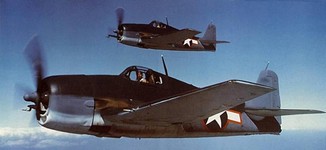
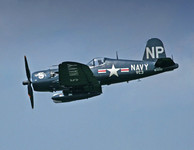
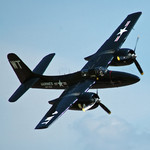
The F6F Hellcat and F4U Corsair both saw extensive service in World War II. The F7F Tigercat served as a night-fighter during the Korean Conflict of the 1950s.
While the F6F-3 Hellcat does share some visual similarity to its Wildcat sibling, the similarities end there. The Double Wasp engine provided more power which allowed the Hellcat to climb with the Zero. Many veteran Zero pilots would actually fall victim to this ability when the Hellcat was first introduced. Zero pilots mistook the Hellcats for Wildcats and would attempt to climb away, going vertical, from the American fighters in hopes of causing a stall, which the Wildcat was guaranteed to do in a vertical climbing maneuver against the Zero. The Hellcat could continue to climb against the Zero into a firing solution and then down the fighter with its six .50 caliber machine guns as the Zero dove down on what it thought would be a stalled Wildcat. The Hellcat had a significantly larger fuel capacity than the Wildcat giving the Hellcat almost double the combat radius of the Wildcat.
The F6F-3 Hellcat joined the Fleet in February 1943 when VF-9 became operational on the USS Essex (CV-9), the first of the new class of carriers, although Essex joined the Fleet after her sistership USS Yorktown (CV-10) because of the hard-driving skipper of the Yorktown, Captain J.J. “Jocko” Clark. The friendly rivalry between the two ships continued throughout the war. The Yorktown took the second, and perhaps more important, milestone on 31 August, 1943 when the first Hellcat launched from its deck on the new carriers first mission to raid Marcus Island. Marcus Island sits 2,700 miles west of Pearl Harbor. The new carriers and crews were the conduct their first combat mission against the lightly defended island in the early morning of the 31st. Task Force 15 was made up of the new carriers USS Essex (CV-9), USS Yorktown (CV-10), USS Independence (CVL-22), the new fast battleship USS Indiana (BB-58), two light cruisers, ten destroyers and a single fleet oiler. No aerial opposition was encountered by the Hellcats of Task Force that first day, although two Hellcats from VF-5 were lost to antiaircraft fire.
The next day, 1 September , Hellcat history was made near Baker Island when VF-6 pilot Lieutenant (jg) Richard L. Loesch made the first kill in a Hellcat when he downed a Kawanishi H8K “Emily” flying boat. He was also the first pilot to have scored while flying both of the Grumman “cats.” Loesch had made his first kill in a F4F Wildcat during the Battle of the Eastern Solomons in August 1942. The Emily was the first of 5,163 claimed kills by Navy and Marine Hellcat pilots. Throughout two years of combat service, Hellcat pilots earned the highest kill-to-loss ratio of any aircraft of World War II at an astonishing ratio of 19-to-1. 305 American pilots became aces flying the Hellcat, more than another American fighter during World War II.
By the fall of 1943, every fleet and light carrier in the Pacific Fleet was stocked with F6F-3 Hellcats. Many of the land installations in the South Pacific had also received squadrons of Hellcats and Vought F4U Corsairs, which would be carrier ready until later in the war. On 5 November the veteran Saratoga (CV-3) and her new companion the light carrier USS Princeton (CVL-23) launched a single strike on the major Japanese base at Rabaul on the island of New Britain. 52 Hellcats escorted 45 Douglass SBD Dauntlesses and Grumman TBF Avengers to the targets resting in the harbor. Nearly 60 A6M Zeroes were in the air to meet the American strike. The Hellcats kept the Zeroes at bay as the SBDs and TBFs scored hits on six cruisers, heavily damaging three of them. Ten carrier planes were lost for roughly the same number of Zeroes. Less than a week later the Americans returned to raid Rabaul on 11 November, Armistice Day, with the three carriers of Admiral Montgomery’s Task Group 50.3.
The USS Essex, Bunker Hill (CV-17), and USS Independence launched 55 Hellcats and 46 Dauntlesses and Avengers on the morning of 11 November towards Rabaul. They were met by 68 Zeroes as they approached Rabaul. Five Japanese warships were hit during the raid including one destroyer sunk. As the carrier planes returned, the weather degraded and a follow up strike was cancelled. However, the Japanese had launched their own counterstrike against the American carriers. At 1350 Hellcats from VF-33 spotted the Japanese counterstrike 40 miles from the carriers. When the fighter controller stationed on the carrier asked for an estimate and was informed “There are millions of them!” In reality, there were 69 Zeroes, Nakajima B5N Kates, and Aichi D3A Vals from carrier squadrons transferred to Rabaul from their carriers stationed at Truk. 40 of the Japanese planes were shot down by Hellcats and land based Corsairs providing Combat Air Patrol (CAP). The American total for the day was roughly 50 kills for the loss of 18 aircraft. On 1 November there had been three Japanese air groups operational on Rabaul totaling 173 aircraft. Following the two American raids, 52 aircraft returned to Truk, almost all of them Zeroes.
The carrier groups of the Pacific Fleet were reorganized into Task Force 50 for Operation Galvanic, the invasion of the Gilbert island atolls of Makin and Tarawa. Six heavy and five light carriers formed the core of Task Force 50 and had 684 planes at their disposal. Every fighter in TF 50 was a Hellcat. On 23 November, the pilots of TF 50 finally made contact with Japanese aerial resistance. VF-16 pilot Ensign Ralph Hanks, got himself an impressive bag. Ensign Hanks was the first Hellcat pilot to become an “ace-in-a-day” by destroying five enemy aircraft in a single day’s work, in his case a single sortie. More than 40 Hellcat pilots became an “ace-in-a-day” in the next two years. The first Hellcat ace was Lt. Hamilton McWhorter, who earned the distinction on 18 November, 1943 after downing a Japanese flying boat near Tarawa.
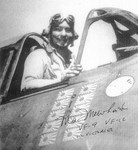
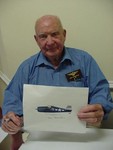
Lt. Hamilton McWhorter of VF-9 became the first Hellcat ace in November 1943. He was the first of more than 300 pilots who became aces in the F6F. He finished the war with 12 kills and the rank of Commander. He passed away in 2008.
During Operation Galvanic, not only did Hellcats provide daytime CAP, there was also a push to develop night fighter tactics to counter Japanese dusk and night torpedo attacks. Lieutenant Commander Edward Henry “Butch” O’Hare, flying an F6F Hellcat along with a wingman in another Hellcat and a TBF Avenger, conducted the Navy’s first ever nighttime fighter mission on 26 November. In a confusing first mission, the three planes had difficulty locating enemy targets until they stumbled upon a Mitsubishi G4M Betty bomber. In the ensuing melee O’Hare’s Hellcat was hit and he was lost. For fifty-four years who had shot down O’Hare remained a mystery. In 1997, historians Steve Ewing and John Lundstrom clearly state that the Japanese guns, and not friendly fire, took down one of America’s first heroes of the Pacific War. In the first months of the war, Butch O’Hare had single-handedly destroyed five G4M Bettys as they sought to strike the USS Lexington (CV-2). For his action, O’Hare received the Medal of Honor from President Roosevelt later in 1942. He had volunteered to return to flight duty and to lead the “Bat teams.” His loss was a great blow to the American naval aviation community.
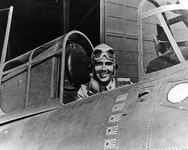
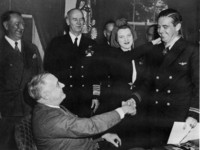
Lt. Commander Edward "Butch" O'Hare sitting in his F4F Wildcat early in the war. He was awarded the Medal of Honor for his actions near Rabaul in the spring of 1942 when he singlehandedly destroyed five incoming G4M Betty bombers.
Over the Marshalls atolls, the fortresses at Truk and Rabaul, New Guinea, the Admiralties and others, the Hellcat performed above expectations. Time after time, Hellcats rose to meet their Japanese adversary and were able to best them using their aircraft’s superior performance and their additional training. Task Force 50 eventually evolved into Task Force 58, commanded by Admiral Marc “Pete” Mitscher, an early naval aviator, and comprised of fifteen carriers carrying almost a thousand aircraft, including more than 450 Hellcats by June 1944. The fast carriers had spent the previous year wisely and had developed new doctrine and tactics to best utilize their strength. Early morning “fighter sweeps” had been developed to suppress Japanese aerial defenses before they had a chance to get off the ground by launching a pure fighter force (at first exclusively Hellcats, but later the F4U Corsair would also be used) against Japanese airfields. In June 1944, the Fifth Fleet, led by Admiral Raymond Spurance, and spearheaded by Task Force 58, launched Operation Forager, the invasion of the Marianas islands of Sapain, Guam and Tinian. The Americans were not only seeking to secure the islands for future operations, Admiral Chester Nimitz, commander of the Pacific Fleet, sought to provoke a fleet engagement with the Imperial Japanese Navy’s Mobile Fleet. Prior to the invasion Nimitz said: “I don’t know anything more we can do to provoke these people into a fleet action.”
The invasion of the Marianas did send the Japanese fleet into motion. The Japanese High Command activated Operation A-Go in early June. The plan called for the Mobile Fleet, commanded by Admiral Ozawa Jisaburo, uniting the carriers and battleships of the Imperial Navy to strike towards the American forces attacking the Marianas from the west after transiting the Philippine Sea. Using the superior range of their aircraft, the Japanese hoped to “shuttle bomb” the American forces using the airfields on Guam, Rota and Tinian. Japanese planes would launch from their carriers, attack the American ships, land on the nearby airfields to rearm and refuel and then launch again against the American fleet on the return to their carriers. This plan was disrupted from the beginning when the Americans destroyed most of the planes stationed in the Marianas in the first fighter sweeps.
Clark Reynolds, the famous fast carrier historian wrote of the American naval strength:
The United States Fifth Fleet in June 1944 comprised the most powerful battle fleet the world had ever known…Task Force 58 included fifteen fast carriers (seven heavy and eight light)..the Battle Line could form no less than seven new fast battleships. Three heavy and seven light cruisers and sixty destroyers made up the rest of TF 58’s strength. The fifteen fast carriers carried 902 aircraft, 452 of which were F6F Hellcats.
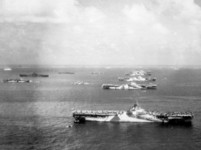
The Fifth Fleet was the most powerful naval force in the world. Here fast carriers and battleships of Task Force 58 sit at anchor awaiting their next assignment.
The Mobile Fleet carried 450 operational aircraft. There were more Hellcats in Task Force 58 than the Japanese had in total onboard their nine carriers! The pilots of the Mobile Fleet were far from the experts of Kido Butai at the start of the war. Most had barely 100 hours of rudimentary training in their various flying and combat roles. By comparison, the average American pilot had two years of training and 500 flight hours before they were even considered for deployment to the fast carriers.
Ozawa launched four raids towards Task Force 58 on 19 June. 373 planes were sent against the Americans. 322 were destroyed by intercepting Hellcats and AA from the ships of the task force. It was an aerial slaughter not seen before. A pilot on the USS Lexington (CV-16) was overheard following one of the raids “This is just like an old time turkey shoot back home.” The Great Marianas Turkey Shoot was born. The Hellcats tore the heart out of what was left of Japanese naval aviation. The Japanese had spent two years rebuilding their carrier strength only to see it destroyed in a single day. Lt. Alex Vraciu was famously captured (and shown in a previous update) on film holding up six fingers, one for each kill he’d scored that day. There were numerous pilots with high kill scores that day.
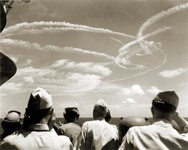
Sailors onboard one of the American carriers watching the "Great Marianas Turkey Shoot" unfold in the skies above them, 19 June 1944.
Throughout the rest of the war the Hellcat would be little improved until April 1944 with the introduction of the F6F-5. Later F6F-5 variants mounted four .50 caliber machine guns and 20 mm cannons. The two cannons provided additional firepower that proved extremely useful against the dreaded Kamikazes. The F6F-5 also allowed the mounting of wing rockets for additional firepower beyond the 2,000 lbs bomb load of the Hellcat.
On 15 August, two strikes were sent to raid Tokyo when at 0635 the carriers came on the air and broadcast:
All Strike Able planes, this is Nitrate Base. All Strike Able planes return to base immediately. Do not attack target. The war is over.
The last dogfight of World War II happened as the American planes returned to their carriers. Lieutenant (jg) M. Proctor of VF-9 shot down two fighters before he destroyed a Nakajima Ki-84 Frank as he made his way to his carrier. This was the last air-to-air kill of World War II, and it was completed by a Hellcat.
The last Hellcat left the Grumman “Iron Works” factory in Long Island, so named because of the ruggedness of Grumman aircraft throughout the war, in November 1945. 12,275 Hellcats had been built, with more than 11,000 of them being built between September 1942 and September 1945. Hellcat pilots in the Pacific and European theaters were credited with a total of 5,216 Axis aircraft in exchange for 270 Hellcats lost in air combat in that twenty-four month period, for an unprecedented kill-to-loss ratio of 19-to-1. A more impressive stat is presented by Barret Tillman who notes:
The Hellcat proved to be a superb bomber escort – something more often attributed to the Army Air Force’s P-51 Mustang. But official Navy records show that from 1943 to 1945, only 42 U.S. carrier-based dive bombers or torpedo planes were known lost to Japanese aircraft.For obvious reasons, fighter pilots weren’t the only people who loved Hellcats.
It's time for CD Projekt Fall 2011 Conference and you're invited!For the third time this year, GOG.com and CD Projekt RED are happy to invite you for the CD Projekt's live stream conference!
Are you eager to know the hottest news about The Witcher 2: Assassins of Kings and get to know what's up at your favourite digital distribution platform? On September 22nd you'll have a great chance to watch news, demonstrations, and an exciting first look at the new gameplay modes of The Witcher 2. On that day, together with CD Projekt RED, we'll live stream our international portions of the CD Projekt Fall 2011 Conference via Ustream video feed. Be sure to log on to GOG.com at 6:00 p.m. Warsaw time (that's 4:00 p.m. GMT, 12:00 noon EDT, or 9:00 a.m. PDT) on Thursday 22 September to watch the conference live.
You want to know what we've cooked up for you? We, GOG.com, will be discussing our performance in 2011 and talking about what’s coming for the rest of 2011, and maybe even hint at some of what’s coming in 2012! CDP RED will be showing off the new features of The Witcher 2 version 2.0 live for the very first time, followed by a live gameplay demonstration of The Witcher 2 for Xbox 360. Last but not least, there is also an official unveil of the box art for the title scheduled to take place on that day.
See you on September 22nd at GOG.com for some exciting news!
EA AND STARBREEZE STUDIOS ANNOUNCE THE REVIVAL OF THE CULT CLASSIC FRANCHISE SYNDICATEI guess we'll just have to wait for that epic CyberMage relaunch.
Guildford, UK. – Sept. 12, 2011 – Electronic Arts Inc. (NASDAQ: ERTS) and Starbreeze Studios today announced the reinvention of Syndicate, a storied franchise at EA. Created by an all-new development team from the awarding-winning studio that brought gamers The Chronicles of Riddick and The Darkness, Starbreeze Studios delivers a unique and brutal sci-fi first-person shooter experience set in a not too distant future, where business is war. Players take on the role of Miles Kilo, Eurocorp’s latest prototype agent, and embark on an epic action adventure full of corruption and revenge.“We are excited to finally reveal what we’ve been working on the past couple years,” says Mikael Nermark, CEO of Starbreeze Studios. "It's been a great experience working with EA, and an amazing opportunity for us to use our expertise in the first person shooter and action genres to bring back, and reignite, the signature action/espionage gameplay of Syndicate.”
Set in 2069, Syndicate takes players into a dark, Machiavellian world run without government oversight with many syndicates vying for total dominance of their local market place. With no one to question their intentions or actions, three mega corporations – Eurocorp, Cayman Global, and Aspari – are at the forefront of this brutal war for control of the pivotal American market. In the world of Syndicate, everything is digitally connected, including the people. Players aren’t limited to the weapons in their hands. Through DART 6 bio-chip technology implanted in their head, players can slow down time and breach the digital world around them to take down their foes using a variety of upgradable hacking mechanics. Syndicate’s blend of fast-paced, futuristic, action shooter settings and story combined with innovative chip breach gameplay instantly immerses players in a unique digital world.
“Our goal with Syndicate is to provide a challenging action shooter for today’s gamers as well as fans of the original. I’m sure they will enjoy and recognize the legacy that made it such a classic,” says Jeff Gamon, EA Partners Executive Producer. “Fans of the franchise will recognize many weapons and environments in the game, but in a whole new way. The game also provides a separate and deep 4-player co-op mode featuring missions from the original cult classic, which adds another layer of depth to the overall experience.”
Syndicate will be available in early 2012 for the PlayStation®3 computer entertainment system, Xbox 360® videogame and entertainment system and the PC. For more information on Syndicate, please visit www.syndicate.ea.com.
"Wing Commander," a video game project that would be a multiyear task, would change gears if it got approval tomorrow, says Chris Roberts, chief creative officer of Blink Media. But at the moment, it's focusing on Quebec as its future home.The big questions now: has Chris Roberts been able work out financing since these articles were published? What part do rights-holders Electronic Arts play in any of this? And why hasn't anyone noticed these references before now?"The cap sort of put a spanner in the works," says Roberts.
"Initially, Origin is set up to deliver EA games, but very soon, we'll be delivering third-party content to Origin," said EA CFO Eric Brown at a UBS conference in London today."We're fairly excited about Origin," Brown added. "We have about 4 million installs of the client, we expect that number to climb substantially as we enter this ... holiday season." EA's PC games now by default install Origin to users' PCs, even if the game is purchased at physical retail.
There are several elements of yesterday's shocker continuing to develop this afternoon. The most telling is a PDF report discovered by Jason Schuitema. It is a semi-annual Michigan Film Office report on projects requesting tax breaks. The report is dated July 15, 2011 and lists "Wing Commander" as a video game currently under review. The production location is listed as Detroit and the company is Wing Commander Productions, Inc. -- the limited liability corporation used by Chris Roberts for the 1999 film.
Meanwhile, Aginor has noted a pair of interesting tweets. On June 25, Mark Hamill noted: "Loved Chris Roberts & the Wing Commander universe. Would love to revisit it, but doubtful it will happen." Then on August 25, Tom Wilson posted: "I did a voice over session for a project so secret that they made me sign a form, and shredded my script right after. Disregard this tweet." We were able to contact Wilson, who denied involvement in a Wing Commander project: "It's not happening. Rumor strongly denied."
Aginor also notes that Chris Roberts is publicly listed in the LinkedIn group for Unreal Engine Developers. That's interesting, as none of his games to date have used Unreal -- although it may be due to some cancelled project, such as Silverheart.
We will keep you updated as news develops. Remember that even this July report is several months old and still does not confirm that the project is anything but a proposal.
Wing Commander creator Chris Roberts shocked fans everywhere three weeks ago during an interview with G4. In a quote now etched in Wing Commander message board signatures everywhere, he announced of Wing Commander that "I feel re-energized, and I think I can come back... and push forward parts of the industry in terms of narrative and cinematic storytelling." The million dollar question was immediately: was he just talking about his hopes for the future... or is a new Wing Commander game already secretly in development?
The question sounds like the stuff of conspiracy thriller novels... but some strong evidence now suggests it may actually be true. Longtime contributor Banjo points us to a an April, 2011 article in the Detroit News about potential tax breaks for film and game projects in Michigan. It quotes a Chris Roberts of "Bl!nk Media International" as having expansive plans for game development in the state (or Quebec, should funding fall through.)
Chris Roberts, a principal in Bl!nk Media International Ltd., wants to make a video game that would take years to build and require full-time workers. But Michigan could lose out to Quebec if Bl!nk's application for $12.3 million in tax credits isn't approved soon, Roberts said. Bl!nk plans to hire 112 residents and spend $31.1 million here. "There'd be multiple games," Roberts said. "We'd be creating long-term employment in Michigan."Is this our Chris Roberts? It's not an uncommon name--Wing Commander III even had two Chris Roberts' on its development team! A check of LinkedIn, however, confirms that Origin Systems' star developer now lists himself as "Chief Creative Officer of Bl!nk Media International." So: what is Bl!nk and is this project a Wing Commander game? It seemed like a dead end... until we were given this (unfortunately poor quality) scan of an infograph included in the print version of the Detroit News article:
Look at the the third line. Listed only as "Video Game" is a project exactly matching the numbers quoted about Chris (112 hires, 31.1 million dollars). Then, in the last column, under "scheduled project actors": Mark Hamill, Malcolm McDowell, Tom Wilson, John Rhys-Davies.
Remember that no announcement has been made. However convincing may seem, it is all circumstantial evidence. It's possible Detroit News decided the list of actors themselves, based on Chris' history. Keep in mind also that the article is five months old and that it is discussing plans rather than anything that had yet been financed. But at the same time, that means it predates the G4 interview. IF Chris Roberts was planning a game with the Wing Commander III and IV cast in April and then telling G4 he hoped to revisit the franchise soon in August... at the very least, the direction seems like good news.
A spirited and elite corps of novice fighter pilots attends the Wing Commander Academy in the year 2655. Often thrust into battle against the mighty and ruthless Kilrathi race, the crew must master daring manoeuvres and veer through constant danger to save the world. Sedate and honorable Maverick, devil-may-care and impulsive Maniac, and serious-minded, cautious and competent Archer make up a quarter of the cadet wing at the academy under their brilliant, if argumentative, captain, Commodore Tolwyn.The set should be available for preorder at US retailers next week; eager buyers (and Canadians) can go ahead and place their order with Amazon Canada.
Ultima V is actually Chris Roberts' first credit at Origin Systems! His role in the project was largely support, but he was listed as one of the game's designer in the finished release. Following Origin tradition, players can actually find and interact Chris in the game itself! He appears as a farmer named Christopher (aka "Dibbs") in West Brittany. Here is his full conversation tree--which culminates in his explaining that he's working on something called Times of Lore... the first game he released at Origin!
Christopher
You see: a dashing young farmer.
Christopher: G'day, {name}!
Player: job
Christoper: I fiddle in the fields to keep me fed.
Player: dibb
Christoper: I see thou hast been speakin' with Phillip.
Player: phil
Christoper: He's me mate!
Player: mate
Christoper: Friend.
Player: fidd or fiel
Christoper: I pride myself in a job well done, even if one does not enjoy it.
Player: enjo or job or done
Christoper: What I really enjoy is writing works of fantasy.
Player: writ or fant
Christoper: I'm currently working on an epic called 'Times of Lore!'
Player: time or lore
Christoper: I hope to have it published soon.
Player: soon or publ
Christoper: Through Origin, of course. Wilt thou buy it?
Player: (any)
Christoper: Then I'll be of little help to you in the future!
Player: y
Christoper: Good! Enchanted, I'm sure, to have met such an enlightened soul. What a nice chap thou art.
Player: bye
Christoper: Ta, mate.
Christopher--and Times of Lore--would get the last laugh. When Richard Garriott redesigned the Ultima interface for Ultima VI, he based the streamlined user interface on the one used in Chris Roberts' recent hit! Shay Addams' The Official Book of Ultima records: "But the most sweeping change would appear in the interface. Influenced by the icon-based interface of Chris Roberts' Times of Lore, Garriott streamlined Ultima's 26 commands into ten icons, one of which was new. In previous games you would "ignite" a torch, "jimmy" a lock, and so on; the new "use" commands could be used for several such actions, reducing the necessary number of commands for the player to master and simplifying the design work." (pp.83-84) You can see the change below--a great early example of Chris Roberts' cinematic sensibilities changing the face of gaming.
This isn't the first time Ultima VI and Wing Commander have lived together! As early as 1991, Origin had the idea to bundle the two titles together in a single value-priced release in the hopes of cross-pollinating between fans of both franchises. An Ultima VI/Wing Commander package was even one of the first CD-ROMs put out by Origin, and it went on to be re-released multiple times through Software Toolworks. These releases were especially cool in that they came in a full box and included all the manuals and artifacts.
Chris Roberts - Ultima VI
Warren Spector - Ultima V
Steve Beeman - Ultima VI
Paul Isaac - Ultima V
Herman Miller - Ultima V, Ultima VI
Steve Muchow - Ultima V
John Miles - Ultima V, Ultima VI
Keith Berdak - Ultima VI
Daniel Bourbonnais - Ultima VI
Glen Johnson - Ultima V, Ultima VI
Denis Loubet - Ultima IV, Ultima V, Ultima VI
John Watson - Ultima VI
Steve Cantrell - Ultima VI
Marc Shaefgen - Ultima VI
Greg Paul Malone II - Ultima VI
Mike Romero - Ultima VI
Jeff Shelton - Ultima VI
Mike Harrison - Ultima VI
Cheryl Neeld - Ultima VI
Kilrathi Dralthi MkIV together with fleet scale Dralthis and Vaktoths. The fleet scale fighter are a real pleasure to paint! I have painted again more, this time a Confed fighter from the WCI era, the Hornet!Time for me to do something totally different; I painted a 15mm Khurasan Felid that might be used as a Kilrathi Noble...
Kay Gilmore, Marie Williams, J. Allen Brack, Andy Sommers, Bret Bonner, Andy Brunke, Chris Roberts, David Downing, Todd Wacchaus, Parick Bradshaw, Frank Roan, Tony Morrne, Kirsten Vaughan and Jenny Parker
The Wing Commander Online Role-playing Game Germany is still holding the line!Since 1998, the Wing Commander Online-Role-playing Game Germany has enjoyed great popularity. They have held up the fan banner for 13 years and continue Wing Commander's unique flair. The group has a constant membership of about 100 active players and a self-developed game environment, where players enjoy exciting missions and stories every day!
We would be glad to see you at www.wingcommander.de. You can be a part of it!
Lindberg's team, which has had success in the past recovering sunken ships and cargo, was using sonar to look for the century-old wreck of a ship that went down carrying several cases of a super-rare champagne. Instead, the team discovered what it claims is a mysterious round object that might (or might not) be extraterrestrial.
Lindberg explained to local media that his crew discovered, on the 300-foot-deep ocean floor between Finland and Sweden, "a large circle, about 60 feet in diameter. You see a lot of weird stuff in this job, but during my 18 years as a professional I have never seen anything like this. The shape is completely round."
Thought I'd try my own take on the WCA DVD cover. Hope you guys like it!Apologies to Howard Day for stealing a shot of one of his Pioneer explosions, it just worked so well!
I did find someone who will, when I get around to explaining what is needed, build the map editor for us (which I feel is the one tool I don't want to make that is holding this project back). If/when that happens, I'll also go back into a development mode for other game features.Meanwhile, on test Game 4, it sounds like most of you want to continue. What shall I do with the remaining ships Pantheos ships?
66 years ago today, the instrument of surrender for the War in the Pacific was signed onboard the USS Missouri (BB-63) in Tokyo Bay. The Missouri was chosen as the site not only because it was the flagship of Halsey’s Third Fleet, but also in honor of President Harry S. Truman who was from Missouri. The mighty American battleship was anchored near the spot where another American, Commodore Mathew C. Perry, had anchored his own fleet in 1853. MacArthur requested that the Navy send the flag that had flown over Perry’s flagship, USS Powhatan, to the Missouri. The flag was flown from the US Naval Academy Museum in Maryland to Japan for the ceremony. This was at the request of General Douglas MacArthur, who was a direct descendant and cousin of Perry. In the image below you can see the flag hanging behind General MacArthur. Note that the flag is flying backwards. This was due to the fragile state of the flag and because of preservation efforts done by the Navy.
A single table was erected on the deck. Two copies of the instrument of surrender were laid on the table, one in English, the other in Japanese. The Japanese were permitted a small delegation to sign the instrument of surrender.
The surrender ceremony lasted twenty-three minutes and was first signed by Japanese Foreign Minister Mamoru Shigemitsu at 9:04 a.m.
General MacArthur was the first to sign for the Allied forces at 9:08 a.m.
At 9:22 a.m., Air Vice-Marshall Leonard M. Isitt of New Zealand was the last person to the sign the instrument of surrender. Following his signature General MacArthur made some short closing remarks:
Let us pray that peace, be now restored to the world. And that God will preserve it always. These proceedings are closed.
Of the American ships in the bay, none was an American carrier. Admiral Halsey had kept the carriers at sea just in case some Japanese did not want to honor their Emperor and government’s instructions. As MacArthur finished speaking, more than a thousand of American carrier planes and hundreds of B-29 Superfortresses roared over the Fleet anchored in Tokyo Bay. The Second World War was over.
Wingnuts can view the ceremony on YouTube.
The Kosco Color film (No Sound)
United News newsreel of the surrender
Wing Commander has two events that borrow from the September 2 ceremony, the 2668 False Armistice and the 2669 Treaty of Torgo / Ko-bar Yagar.
The False Armistice ceremony shares a considerable amount with the September 2nd ceremony which is not too surprising given William Forstchen background in history. Whereas the 1945 ceremony took place onboard the USS Missouri, the 2668 ceremony took place on an unnamed frontier orbital base. A single two meter table was placed in the middle of the base’s hangar. On top of the table sat two copies of the armistice, one in standard English and one in Kilrathi. Like the Japanese, the Kilrathi did not have any dignitaries there to witness the event beyond the party that was to sign the instrument of surrender. The Confederation, just like the Americans, had a large contingent of personnel and members of the press to watch the ceremony.
Baron Jukaga nar Ki’ra, representing the Empire of Kilrah, signed the armistice and proceeded to give a brief closing remark that very closely mirrored MacArthur’s on remarks in 1945.
Friends, this armistice is but a start. Let us truly come to realize that the universe is big enough for both of us and that a permanent peace can be arrived at. These proceedings are now ended.
The False Armistice lasted until the discovery of the Hakaga supercarriers by Commodore / General James Taggart and Captain Ian St. John which forced the Kilrathi to move up the time of their offensive into the Sol System. The Earth Defense Campaign saw the Battles and Destruction of Warsaw and Sirius as well as the Battle of Earth where Admiral Tolwyn and General Grecko’s bold and suicidal plan, along with timely intervention by Landreich forces, prevented the radiological destruction of Earth’s biosphere by Kilrathi nuclear bombardment.
On September 24, 2669, Colonel, later Commodore Christopher Blair dropped the Temblor Bomb on Kilrah, destroying the planet. Soon after the Terran Confederation and Empire of Kilrah signed the Treaty of Torgo, know to the Kilrathi as the Treaty of Ko-bar Yagar, on the deck of the TCS Victory in the Torgo system. The Kilrathi had actually captured the system from the Confederation following the loss of the TCS Behemoth.
Much like the ceremonies on the USS Missouri and an unnamed frontier base, a simple table was the only furniture. Baron Melek, retainer to the deceased Prince Thrakhath, signed for the Empire of Kilrah. Crown Prince Thrakhath had been killed by Christopher Blair during the raid of Kilrah. Admiral Tolwyn signed for the Terran Confederation. Again the Terrans had a large delegation while the Kilrathi brought only a few. A flyby by four Hellcats took place at the end of the ceremony. The war was over.

Follow or Contact Us